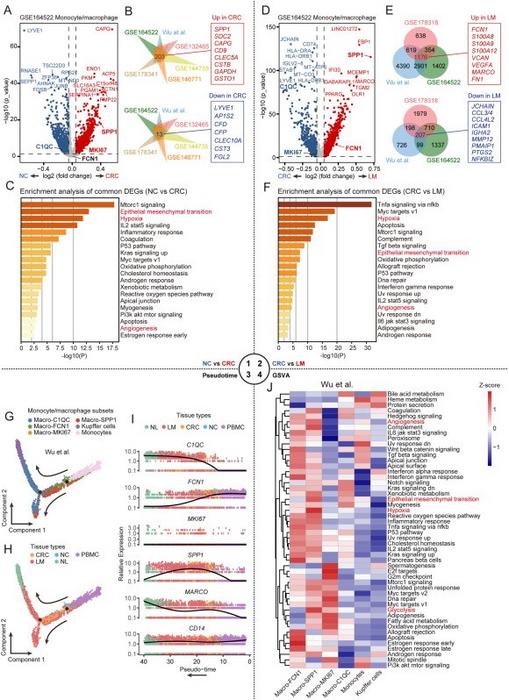
Colorectal cancer (CRC) is a formidable global health challenge, routinely ranked as the third most commonly diagnosed malignancy and the second leading cause of cancer-related mortality worldwide. The battle against this pervasive disease is particularly complex due to the intricate mechanisms within the tumor microenvironment (TME). Despite breakthroughs in immune checkpoint blockade therapies that have shown efficacy in various solid tumors, CRC has remained relatively resistant to similar immunotherapeutic strategies. This resistance underscores the urgent need for deeper insights into the TME’s multifaceted landscape to identify viable targets for novel immunotherapies.
A groundbreaking study recently published in the journal Genes & Diseases sheds light on the roles and mechanisms associated with specific immune cells, particularly SPP1+ macrophages, in the context of CRC. Conducted by a research consortium from Xi’an Medical University, The First Hospital of China Medical University, and Air Force Medical University, the study utilizes cutting-edge single-cell and spatial transcriptomics methodologies alongside bulk sequencing approaches. This integrative perspective allows for a more comprehensive examination of the intricate interactions occurring within the TME as CRC progresses.
Among the pivotal findings of this research is the identification of four distinct macrophage subsets within CRC tissue: FCN1+ macrophages, C1QC+ macrophages, SPP1+ macrophages, and MKI67+ macrophages. A striking observation was the consistent rise in the number and proportion of SPP1+ macrophages observed throughout various stages of CRC development, progression, and metastasis. This correlation strongly suggests that these SPP1+ macrophages may play a significant role in facilitating CRC progression and metastasis, thereby presenting potential targets for therapeutic intervention.
Notably, the study also challenges the longstanding M1/M2 polarization paradigm in macrophage biology. The results indicate an increase in the proportion of M1 macrophages and a decrease in M2 macrophages within the context of CRC, refuting the classical understanding of macrophage polarization and prompting questions regarding the immunological roles of these distinct populations in tumor biology. Such counterintuitive findings emphasize the need for revised models to accurately describe the behavior and functions of immune cells within tumors.
Functional analyses reveal that SPP1+ macrophages might actively promote CRC through several critical mechanisms, including epithelial-mesenchymal transition (EMT), which enhances the tumor’s invasive potential, hypoxia, and metabolic reprogramming through glycolysis. Additionally, these macrophages appear to engage in immunosuppressive pathways that could hinder effective antitumor immunity, thereby allowing the tumor to thrive amidst immune pressure. This multi-faceted involvement highlights the importance of macrophage subsets in CRC and their potential as therapeutic targets.
Another compelling aspect of this research is the demonstrated potential for preoperative chemotherapy to significantly reduce SPP1 expression levels in CRC macrophages, particularly among patients who exhibit a favorable response to treatment. This finding introduces an intriguing possibility that SPP1+ macrophages may also have relevance in the context of immunotherapy, potentially informing treatment strategies aimed at augmenting the efficacy of chemotherapeutic and immunotherapeutic approaches.
The inhibition of the CSF1-CSF1R axis, a major focus in macrophage-targeted immunotherapy, presents another layer of complexity. While such inhibition leads to the depletion of protective C1QC+ macrophages, it unfortunately spares functionally malignant SPP1+ macrophages. This observation raises critical concerns regarding the therapeutic viability of anti-CSF1R therapies in clinical settings, where selective targeting of immune subsets is paramount for successful treatment outcomes.
In summary, the insights provided by this comprehensive analysis significantly enhance our understanding of SPP1+ macrophages in CRC. The research delineates their origins, distributions, and clinical implications, offering valuable information on their functional pathways. Furthermore, the introduction of the SPP1+ macrophage model theory elucidates the dynamic shifts in macrophage populations during the process of CRC liver metastasis (CRLM). Such theoretical frameworks can guide clinical strategies and aid in refining diagnosis and treatment approaches for CRC patients.
The implications of these findings extend well beyond the laboratory and into the clinic, emphasizing a growing recognition of the need for precision in macrophage-targeted immunotherapy strategies. As clinical applications continue to evolve, the integration of insights from studies like this will be crucial in shaping future therapeutic paradigms and improving patient outcomes in the battle against colorectal cancer.
The research not only advances scientific knowledge but also provides a foundation for innovative therapeutic strategies aimed at leveraging the tumor microenvironment to combat CRC. Future investigations will likely build on these findings to explore novel treatment combinations and refine existing therapies in pursuit of improved efficacy against this predominant malignancy. As the discourse surrounding CRC continues to expand, the potential for breakthroughs in macrophage biology remains promising, offering hope for enhanced patient care and outcomes.
Subject of Research: The role of SPP1+ macrophages in colorectal cancer
Article Title: SPP1+ macrophages in colorectal cancer: Markers of malignancy and promising therapeutic targets
News Publication Date: [Please Insert Date]
Web References: [Please Insert URLs]
References: [Please Insert References]
Image Credits: Genes & Diseases
Keywords: Colorectal cancer, macrophages, tumor microenvironment, SPP1, immune therapy, immunity, cancer progression, macrophage polarization, epithelial-mesenchymal transition, immunosuppressive pathways, chemotherapy, therapeutic targets.
Tags: colorectal cancer progression mechanismsCRC global health challengesimmune cells and colorectal cancerimmune checkpoint blockade in colorectal cancerimmunotherapy resistance in CRCmacrophage subsets in tumor tissuemacrophage-driven cancer therapiesnovel therapeutic targets for CRCsingle-cell transcriptomics in cancer researchspatial transcriptomics in oncologySPP1+ macrophages in colorectal cancertumor microenvironment in CRC





